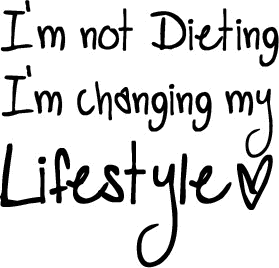When is a diet not a diet?
Are you unhappy with yourself? Are you thinking of going on a diet again to make yourself happier? Diet culture is everywhere. Type the word ‘diet’ into google and you’ll find enough diet options to choose from. So which one will you choose? How do you choose from the hundreds out there? Or should you even be choosing one?
If you’ve been on a diet before, what have you learnt? You would have learnt that if you stuck strictly to the diet you would have been able to lose weight, but when you stopped the diet, and went back to old eating habits the weight came back! So the question we need to ask is why did you come off the diet? Why is it that people only stick to a diet for a finite amount of time?
The answer is actually very simple. The diet was not easy to follow! Diets are generally very strict, they often incorporate foods that you may not like, or that are too expensive to buy long-term, and they don’t teach you how to manage certain events such as eating out, holidays, or even weekends. This makes continued use of the diet impractical, leading you to slowly slip back into old eating habits and behaviours. These diets are generally referred to as ‘fad diets’, and although they can get to you to lose weight short term, they actually create far more long-term problems with your health and metabolism specifically, but also psychologically.
So when is a diet not a diet? When it is simple enough to fit into your lifestyle (no, you shouldn’t have to change your lifestyle for a diet!) and you know how to manage your eating in less structured times. But this means something needs to change long-term.
I believe that the true success of a weight loss diet/plan is measured by the ability to keep the weight off over time |
Diet versus lifestyle
The way that we need to look at the problem is not to go on another diet, but rather learn what lifestyle changes we need to make to bring about success. Although food intake does play a major role in our body weight, there are many other factors that also need to be assessed. Some of them include movement, sleep, emotions and stress.
One problem with this is that we want immediate results with minimum effort (pretty much the nature of human beings). Changing eating behaviours is not easy – in fact, it is very difficult. And because we think we have to be perfect, we make it even more difficult for ourselves, because you will make mistakes over time. We need to learn how to manage situations. There is no one right for every situation. I believe we need to change how we approach the change of behaviours.
Another problem is that the media has made healthy eating much  too complicated! Changing eating habits into healthier ones does not need to mean extreme changes in food types. Unfortunately, if you follow the mainstream media, it can be very confusing. As an example: ‘I can’t eat normal bread, only gluten free bread.’ But gluten free bread costs much more and is not as available. That’s going to be a problem long-term. If you are in fact not intolerant to gluten, why cut it out? You can be just as healthy with it, AND it will be easier to stick to the healthy eating long-term! We need to rethink healthy vs not healthy. There are many simple foods that don’t cost too much that are healthy. What is unhealthy is cakes, biscuits, crisps, fast-food, even if it is ‘sugar’*-free, gluten-free, and whatever else free they are trying to sell you at a fortune. You can have a very healthy eating plan with very basic foods – it is a myth that healthy eating has to be expensive. And this strict line of thinking has also lead to many psychological issues with eating – eating disorders are rife at this time.
too complicated! Changing eating habits into healthier ones does not need to mean extreme changes in food types. Unfortunately, if you follow the mainstream media, it can be very confusing. As an example: ‘I can’t eat normal bread, only gluten free bread.’ But gluten free bread costs much more and is not as available. That’s going to be a problem long-term. If you are in fact not intolerant to gluten, why cut it out? You can be just as healthy with it, AND it will be easier to stick to the healthy eating long-term! We need to rethink healthy vs not healthy. There are many simple foods that don’t cost too much that are healthy. What is unhealthy is cakes, biscuits, crisps, fast-food, even if it is ‘sugar’*-free, gluten-free, and whatever else free they are trying to sell you at a fortune. You can have a very healthy eating plan with very basic foods – it is a myth that healthy eating has to be expensive. And this strict line of thinking has also lead to many psychological issues with eating – eating disorders are rife at this time.
Lifestyle change can and will work if you have realistic expectations, good support (especially if you have a lot of emotional or psychological eating habits), and choose a plan or style of eating that you can stick with. Weight loss and keeping that weight loss off can be easy if you learn how to use food correctly again and change your behaviours over time. Nothing extreme.
* Remember that sugar-free generally means sucrose (table sugar) free. Another type of ‘sugar’ will be added to sweeten the food. And at what health implication and cost?


